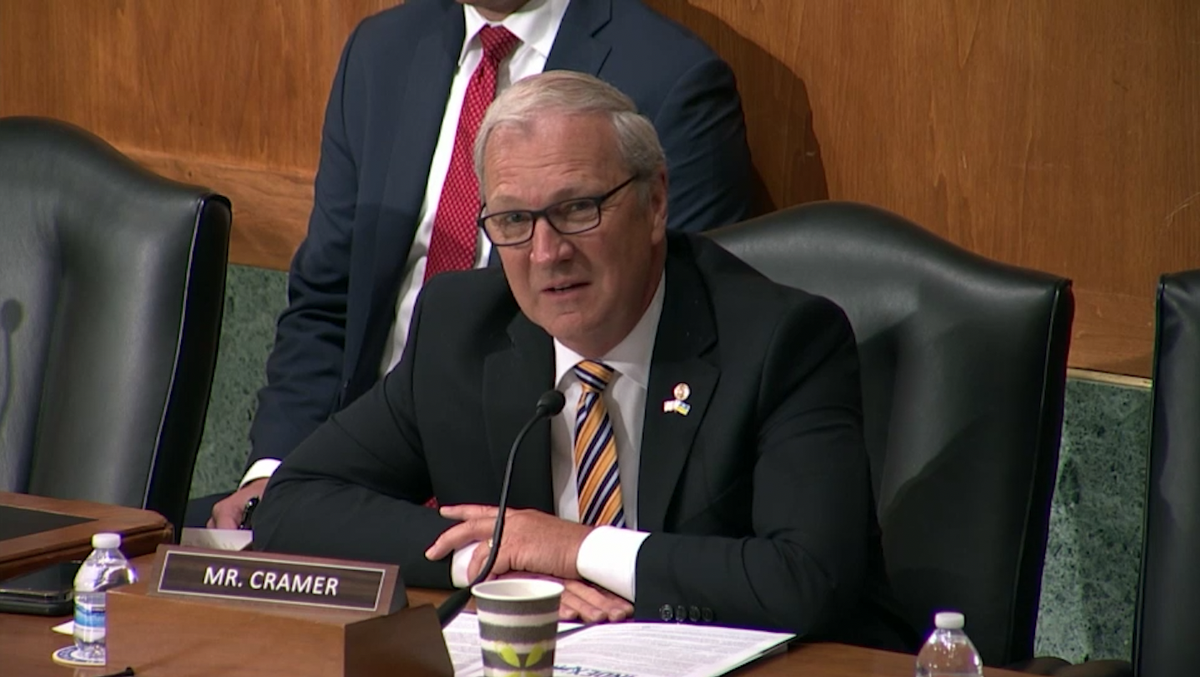Source: United States Senator Kevin Cramer (R-ND)
***Click here to download video. Click here for audio.***
WASHINGTON – U.S. Senator Kevin Cramer (R-ND) discussed the Investor Democracy is Expected (INDEX) Act, legislation he introduced with Senator Dan Sullivan (R-AK) last month to address problems stemming from the consolidated corporate ownership and voting power within Wall Street’s largest investment advisers and their index funds at a Senate Banking Committee hearing.
“I am a co-sponsor of the INDEX Act. I’m also the sponsor of another similar [bill] related to traditional lending, the Fair Access to Banking Act. I wanted to ask about no-action requests. We’ve seen the granting or denial of no-action requests. Is there a risk of less than even-handed handling of no-action request with regard to with regard to [Index funds]?” asked Senator Cramer.
“I think speaking broadly, there has been some academic research that suggests it does matter somewhat. Which SSD staff member receives that no-action request, and so there’s been some academic research into that issue. I think that is maybe evidence of what you’re speaking about that there’s sort of personal variability within the SEC, maybe diversity of views on what is appropriate and isn’t. I would also note that there have been some recent changes as to what can and can’t be excluded so someone might be asking to exclude a shareholder proposal from an upcoming meeting and requesting a no-action letter on that basis. I think that we’ve changed some of the policy there and potentially disturbed some long-standing positions. But I think with respect to Index funds, I wouldn’t say it’s particularly a major issue with respect to proxy voting,” responded Professor Griffin.
Senator Cramer then pivoted to a discussion on the pushback from states against Environmental, Social, and Governance (ESG) financing by the nation’s largest financial institutions.
“Let me ask you about the rule of states because we’re seeing red state pushback, as they call it. Not all states are created equal. But every state, particularly their state funds, provide a lot. I think of a state like Texas, for example, West Virginia another one that recently passed state laws similar to the INDEX Act. In some cases, they might even be more aggressive in terms of their own pushback guidance. Do you see any concerns about the federal government doing one thing or states doing their own thing? What if [the federal government doesn’t] do anything? What could be the outcome or the consequence of states taking this on their own?” asked Senator Cramer.
I think that it will potentially become further politicized at the state level and then have sort of a difficult-to-navigate situation for these asset managers. I think that can increase costs as well. So certainly, it’s maybe the best course of action for the states if the citizens desire it. But I do think that there are risks to that approach as well. The fragmentation that you mentioned, I think could be detrimental. I think that there’s a desirability of a unified standard and federal action on this issue,” responded Professor Griffin.
“I almost never say that. But there are situations, there are a couple places in the Constitution where they give the federal government some say. I would think this might fit into interstate commerce,” said Senator Cramer.
Senator Cramer concluded by discussing the impact of politicizing energy sector index funds. He also called for more realistic governance in the financial sector.
“Has anybody come up with an [Index fund] like ‘Reliable Electricity Index’ or ‘Reliable Low-Cost Energy Index?’ We pick these very political criteria in the energy sector with very little regard. When we talk about the long-term, we have to think long-term. 2050 is a long ways off. 2030 is closer, but 2022 is on us. It’s here right now and inflation is not a fantasy. It wasn’t created by Vladimir Putin, although he certainly has enhanced it with his behavior, but we were heading this way already. It just seems to me that if we’re going to have [index funds] based on political criteria, they ought to be grounded in some science, not just somebody’s perceived crisis. Let’s be a little more realistic about governance,” concluded Senator Cramer.
Background:
The INDEX Act would require investment advisors of passively-managed funds to vote proxies in accordance with the instructions of fund investors—not at the discretion of the adviser. The adviser would be responsible for passing through the proxies, collecting the instructions, and dutifully voting according to the investors’ wishes. Deconsolidating this voting power will neutralize the dominance of these investment advisers and foster a healthier, more competitive, and more democratic corporate governance ecosystem.
In 2021, Senator Cramer introduced the Fair Access to Banking Act, which would protect fair access to financial services and ensure providers operate in a safe and sound manner. It builds off the Trump Administration’s Fair Access Rule and the Freedom Financing Act which Senator Cramer introduced last Congress.
